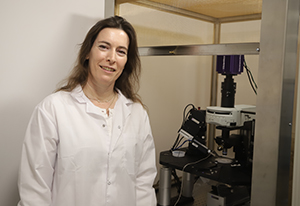
HAIFA, Israel (Press Release) — A new study by a researcher at the University of Haifa, published in the prestigious journal Molecular Psychiatry, part of the Nature group, has found for the first time that 75% of the genes associated with autism are also associated with schizophrenia.
“Until now, we were unaware that these two disorders share such a large proportion of genes. We were very surprised by this finding, since previous studies only identified a few shared genes despite shared symptoms between schizophrenia patients and people with autism. The new findings reveal a much larger quantity of shared genes, and this is a very significant breakthrough in research,” explained Prof. Shani Stern, the senior author of the study.
Autism Spectrum Disorder (ASD) is a developmental disorder characterized by difficulties in creating, understanding, and maintaining social relations. The disorders on the spectrum are hereditary and typically include various difficulties in interpersonal relations and in the social, linguistic, and communications fields. Schizophrenia is a chronic mental disorder with a strong hereditary component that impairs functioning and typically features psychotic symptoms. According to the World Health Organization, some 24 million people around the world suffer from this disease. Prof. Stern notes that previous studies undertaken in recent years have cast light on the links between the autism spectrum and various neuropsychiatric disorders.
In the current study, Prof. Stern and research students from her laboratory in the Sagol Department of Neurobiology at the University of Haifa, together with Prof. Ahmad Abu-Akel from the university’s School of Psychological Science, undertook a quantitative meta-analysis examining a series of genetic studies undertaken over the past decade. Their goal was to identify genes associated with ASD. “Identifying the genes that cause ASD is regarded as a complex and challenging task, mainly due to the wide range of symptoms and the large number of genes involved in this phenomenon. This is why we decided to undertake a quantitative meta-analysis,” Prof. Stern explained.
After analyzing the findings, the researchers were surprised to find that 75% of the genes that were attributed to ASD are also associated with the genes involved in schizophrenia. Significant genes common to both disorders include CACNA1C, which is responsible for providing instructions to create calcium channels. Two other important genes identified are TCF4, which provides instructions for the protein involved in developmental processes, and SORCS3, which codes for the protein that suppresses cytokine signaling.
The researchers also used the meta-analysis method to identify the shared phenotypes (expressions of particular characteristics) found in the nerve cells of people suffering from ASD; this examination employed an innovative method for reprogramming stem cells known as Sendai Reprogramming. This method facilitates the measurement of live human nerve cells in patients without the need to sample nerve cells from their brains. The data were also obtained from a series of studies undertaken at Prof. Stern’s laboratory on neurons sampled from schizophrenia patients and patients with ASD.
The results of the study show that at stages parallel to the fetal stages, in people suffering from ASD, there is accelerated development of cortical neurons. However, these neurons then deteriorate rapidly during their maturation phase. During these phases, the neurons show a decline in activity and connectivity, evident in repressed synaptic activity in their mature phase, by comparison to a control group of healthy individuals.
Among schizophrenia patients, again by comparison to the control group, the development of cortical neurons is delayed during the fetal stage. However, in their mature phase, the neurons behave similarly to those derived from patients with ASD, showing a decline in activity and connectivity between the neurons. “It’s amazing to see that although the developmental stages of the neurons are so different in patients with ASD and those with schizophrenia, and a divergence of phenotypes can be seen, the phenotypes then converge as the neurons mature. By this stage, their behavior is similar in both these neurological disorders,” Prof. Stern concluded.
*
Preceding provided by the University of Haifa